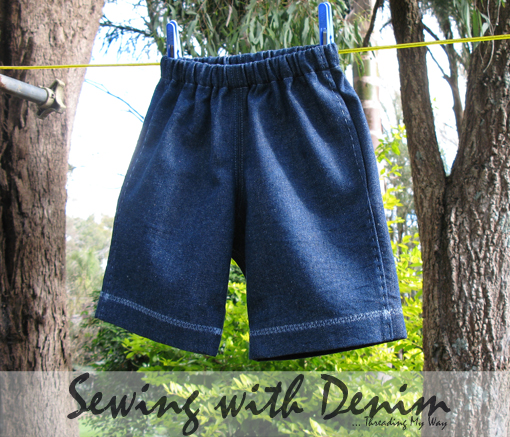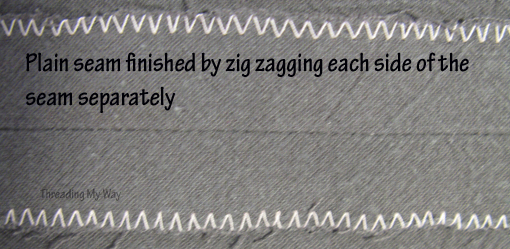
However, denim is not the easiest of fabrics to sew, mainly because it is so thick. Following are my tips for sewing successfully with denim.
Go slowly when you are first sewing with denim and while you are finding out the limitations of your machine. I am lucky enough to have a sewing machine which easily sews denim, but not all machines are created equal. You may just find that your machine can't tackle multiple layers of thick fabric.
I ALWAYS use a denim or jeans needle when sewing with denim. The needle is strong and has a sharp point which makes it easier to sew through thick fabric. I usually use Klasse Jeans Needles, mainly because that's what my nearby stores sell, but there are several other brands available.
Use the handwheel of your machine when first sewing through very thick sections of a project, such as hemming over seams, or sewing multiple layers together. Depending on your machine, you may always need to use the handwheel for these sections. Go VERY slowly when seeing if you can use the foot pedal. If the machine struggles at all, go back to the handwheel. Continuing to sew with the foot pedal, while the machine is struggling, will most likely result in a broken needle, the needle ending up stuck in the down position, or worse still, breaking something in the machine. If you are using the handwheel (as long as you don't force anything) and the machine can't handle the thick layers, it's unlikely you'll break anything. Check your manual to see which way to turn the handwheel. With most machines, turn the handwheel toward you.
Reduce bulk wherever possible. Some machines will easily sew through multiple layers of thick fabric, however, others will struggle. You can sometimes use different techniques so less layers of fabric are being sewn at the same time. When neatening edges, zig zagging both sides of the seam separately and pressing in opposite directions, will mean less layers to sew through, especially if you are then turning the fabric to sew a hem.
If you have a seam which has been neatened by sewing both sides of the seam together, sewing a hem can be difficult, as there are 6 layers of fabric to sew through, where the seams meet. To overcome this, place the seams in opposite directions when you turn the hem, so that you are only sewing through 3 layers of fabric. To do this, you are actually twisting the seam which is hidden by the hem.
When refashioning jeans, you will most likely come across thick seams. Where possible, try to offset them so they are not being sewn together. With the denim fabric basket below, the existing seams on one side are not centred, so the thickest existing seam doesn't actually touch the seam under the basket. This was not initially intentional, as I actually tried to make them line up, but was the result of the shape of the jeans leg. Just moving where the seam lines up, can make a big difference to the thickness you are sewing through. Especially with jeans, you can make an off centred seam a feature of the project.
You can buy a special jeans foot for some sewing machines. Again, it helps to sew through thick or multiple layers of fabric, especially when doing hems where you have to sew over seams. I do have one for my machine, but only use it when sewing through very thick layers. It will all depend on the capabilities of your machine.
Some denim frays quite easily, so I often zig zag or overlock (surge) the edges of the fabric, as soon as I've cut it and before I begin to put the project together, especially if it's a garment such as the All Day Skirt. The denim I used for that project frayed a lot.
Once you've successfully sewn denim on your machine, you may want to experiment with different types seams. Welt seams and flat felled seams are typically found on jeans because they are strong and won't fray. They can be bulky, however, so you'll need to know how much bulk your machine can handle and they are not necessary. Neither of the garments on this page have either welt or flat felled seams, although I have used them in other garments.
Contrasting thread works really well with denim. Normally it would be done with a machine, but on the denim Mud Puddle Splashers below, I did hand stitching on the side seams and then a machine embroidery stitch on the hem.
Whether sewing with denim bought from the shops, as in the Mud Puddle Splashers and the All Day Skirt, or sewing with pre-loved denim, the principles are the same.
As I have mentioned, my current machine easily takes sewing with denim in its stride. With my previous two machines, however, I had to work much harder. The tips above are what has worked for me over the years. What tips do you have for sewing denim?
To add to my experiences of sewing with denim, below are a few links you may find helpful...
- Sewing Through Thick Layers of Fabric
- Sewing Denim and Thick Fabric
- Sewing Multiple Layers of Heavy Fabric... I haven't used this technique as my machine comes with a plastic gadget that does the same job, as will a jeans presser foot.
- Two Essential Tips for Sewing Thick Fabric
- Sewing Thicker Fabrics on Your Brother Machine... I didn't know this was possible till I saw this video. It works on my Bernina, too. I haven't sewn fabric with this much thickness, but I'll now know how to get the fabric under the presser foot when I do.











Great tips Pam! I really enjoy sewing with denim as well, I recently made Anna an Oliver & S Sunday Brunch skirt in denim.
ReplyDeleteFunny - I just came up from the dungeon (basement, lol) where I whipped up a denim bib made using worn out jeans I appropriated (stole) from our youngest lad :D When I cut down the jeans I don't save any parts with seams - I've broken too many needles, and my Babylock really doesn't like thickies. I used a size 16 needle (didn't have any jeans needles), and when I did the topstitching I lengthened the stitch to 3.0 - it was a very simple bib (I did applique a tie on it though - very cute :D) and I didn't have any problems. I love working with upcycled denim, but it does sometimes come with challenges, that's for sure! I've never heard of a jeans foot - I'm going to check that out :D
ReplyDeleteWonderful tips Pam. I'm planning a few projects with denim again soon so it will be good to refresh my memory!
ReplyDeleteThanks for the tips Pam, I would be lost without my Jean-a-ma-jig it really helps to get my machine through those thick seams
ReplyDeletehttp://www.dritz.com/brands/showcase/details.php?ITEM_NUM=915
I love denim, it's my favourite fabric, so I was really interested in these tips. I've worked out for myself about using the handwheel for multiple layers, but lots of the other tips are new to me, so thank you for the post :)
ReplyDeleteThanks for the tips! I have a box full of old pants and jeans that I need to upcycle.
ReplyDeleteLove all these tips! Thank you so much!! You know how much I love my denim! :)
ReplyDeleteGina @ Gina's Craft Corner
Thanks for your tips - my machine definitely does not like sewing denim and usually has a tantrum when I'm topstitching even with a jeans needle. I usually use my mum's old 70s Husqvarna that is bright orange for my denim sewing - it powers through anything!
ReplyDeleteGood morning, Pam. You shared all the tips that I have. I do enjoy the sturdiness and versatility of denim as well.
ReplyDeleteBlessings to you from Harvest Lane Cottage,
Laura
Great tips! Thank you for sharing them at Tuesdays with a Twist! I just bought some denim fabric and hope to make a diaper bag with it! -Marci @ Stone Cottage Adventures
ReplyDeleteTomorrow, I will be co hosting The Great Blog Train and hope you can hop on board!
Great tips! I have used that heart denim myself in a couple of projects :) thanks for linking up
ReplyDeleteWould love to know what machine you use that makes sewing denim easier???
ReplyDeleteI have a Bernina Aurora 440QE and I LOVE it!!!
Delete